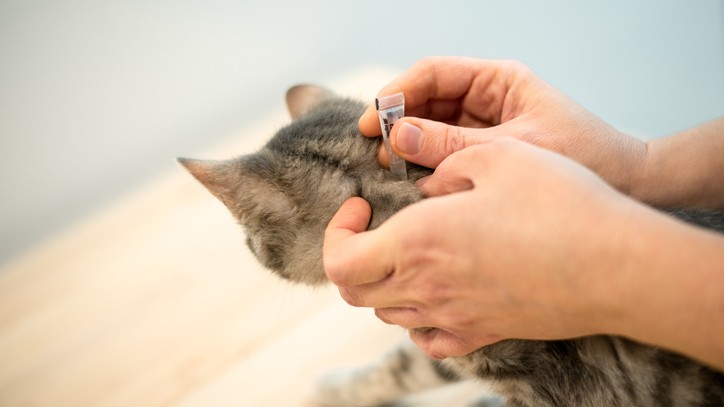How do topical flea treatments work?
Are topical flea treatments right for your pet? Read on to find out!

Topical flea treatments are a common method pet parents choose to keep their pets protected from fleas - and for good reason. Fleas can not only make your pet itchy and uncomfortable, but they can also transmit tapeworm and other infections. Because of this, parasite control is essential, whether it's in the form of the best flea treatment for dogs or the best flea treatment for cats.
Not only can fleas cause your pet serious health issues, they can create a nasty infestation in your home, which can be frustrating and time-consuming to clear! A single female flea can lay up to 50 eggs in a day, so even a few fleas on your pet can quickly become a major problem. A prescription flea treatment will be necessary to combat the infestation, and your pet will need to be treated for at least three months.
To help you choose the right product for your pet, we’ve answered some of the most common questions about topical flea treatments below.
- Best flea collar for dogs: Protect your pooch from unwanted critters
- Best flea collar for cats: Protect your kitty from tiny pests
- "Why is my flea treatment not working?" Our vet offers some answers
How do topical flea treatments work?
Different flea treatment products contain different medications, so each product works in a slightly different way. Some of the best topical flea treatments for cats kill adult fleas immediately on first contact. Some products also contain a repellent, so fleas will avoid jumping straight back onto your pet. Many flea treatment products also include medications that kill or repel other creepy-crawly parasites, like ticks or disease-spreading flies.
It can be tough to know what is best for your furry family members with so many different products. The prevalence of parasites and the products available to prevent them will vary depending on your geographic area. Still, your veterinarian can advise you on which products are most appropriate.
Is topical flea treatment safer than oral?
The safest flea treatment depends on your pet's individual needs. A topical flea product might be recommended for pets with a history of sensitivity to certain oral medications. Many topical flea products are not absorbed systemically. This means that the drug does not cross the skin barrier or enter your pet's bloodstream, which can be safer for some pets if they’ve reacted to medication before. If your pet has experienced side effects from oral flea medications in the past, ask your veterinarian to help you choose a suitable topical flea product. If the drug within the topical treatment is not absorbed into your pet’s body, this should reduce the risk of any side effects.
The most common side effects of topical flea treatments are minor reactions like hair loss, redness, itching, irritation, scabbing, and inflammation where the treatment was applied. If your pet has had a history of reactions to topical medications or has skin problems like allergies or chronic infections, an oral flea treatment might be a better option. Before choosing any flea treatment, it's best to discuss the options with your veterinarian. They can recommend a product that is safe, effective, easy to give, and a good fit for your budget as well as your furry friend.
Get the best advice, tips and top tech for your beloved Pets
Does topical flea treatment wash off?
One of the downsides of topical flea treatments is that many of these products wash off! So, if your pet is a swimmer or gets frequently groomed, a topical flea treatment may not be the best idea. Instead, oral medication can ensure that your pet stays protected all month long, no matter how often they swim or bathe. Some topical flea treatments do stay on if your pet swims, as long as you allow them to dry thoroughly after the initial application.
However, most are no match for the best dog shampoos. Make sure you read the instructions on the packaging or contact the manufacturer before use to find out whether your pet can swim or take baths while using a particular treatment. If the manufacturer advises against these activities, an oral flea treatment may better suit your pet’s lifestyle.

Can topical flea medicine make my pet sick?
Like any medication, topical flea treatments do have some possible side effects. The most common side effects of topical flea treatments are hair loss, itching, irritation, scabbing, and inflammation at the site where the treatment was applied. If side effects occur, you should wash the product off your pet immediately and contact your veterinarian for further advice. They’ll also be able to update your pet’s record and report the reaction to the drug company.
More serious adverse reactions to a topical flea treatment can occur in rare cases. These reactions may be more common in topical flea treatments that are absorbed through the skin into your pet's bloodstream. If you suspect your pet may be having a reaction to a topical flea treatment, contact your veterinarian or your local veterinary emergency hospital right away for guidance.
How to choose the best topical flea treatment for your pet
When choosing a topical flea treatment for your pet, there are several factors to consider. To find the best product for your pet's needs, you'll need to think about your pet's age, health status, and lifestyle. Does the product label indicate a required age range to use this product? Has your pet had a history of skin problems that a topical product may exacerbate? Does your pet swim or bathe frequently? How often will your pet be exposed to areas where fleas may be hiding? Does your pet need protection from ticks as well? Considering all of these questions will help you choose the best product to keep your pet protected.
You should also consider your own needs and capabilities to help you choose a product that will fit your budget and lifestyle. How often are you able to apply the product? Is a collar or a spot-on treatment easier for you to use? How much money are you willing to spend? Your compliance with the flea treatment regime is essential to its success, so pick a product that fits your needs, too!
Topical flea treatments: just one option to protect your pet
Topical flea treatments are safe and effective for most pets. Your veterinarian can help you pick a topical flea treatment that takes your pet’s unique needs into account, as well as your own needs, lifestyle, and budget. Be sure to use flea prevention all year round to keep your pet protection and to prevent an infestation in your home.
Dr. Elizabeth Racine is a small animal general practice vet covering all things pet health and wellness. Her special interests include veterinary behavior, nutrition, and internal medicine.
As a freelance writer, Dr. Racine has written content for major companies in the industry such as the American Kennel Club, Merck Animal Health, Bayer PetBasics, Elanco, and CareCredit. In her free time, Dr. Racine enjoys playing trampoline dodgeball, hiking with her beagle Dasher, and spending time with her three mischievous cats.

